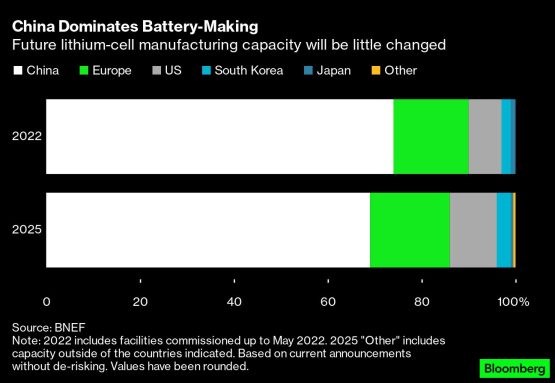Africa doesn’t have a supersized battery factory of its own — at least not yet.
The idea of “gigafactories” capable of producing batteries that can store at least 1 billion watt-hours of electricity, or roughly enough to go into 16,000 Tesla Inc. Model 3 electric cars, became popular after Elon Musk used the term for his first sprawling battery facility in Nevada. Today there are hundreds of battery factories at this scale across Asia, North America and Europe.
China, by far the world leader in battery production, has at least 180 large battery factories. Emerging economies such as Mexico and Thailand have some big battery plants as well. So far, however, there are none of significant size in Africa or South America, even though developing countries on both continents are important sources of the metals that are essential for producing electric vehicle batteries.
First for Africa
That could change following an agreement announced last week between Chinese battery manufacturer Gotion High-Tech Co. and the Kingdom of Morocco. The memorandum of understanding envisions the first factory for EV batteries in Africa, with an annual capacity of 100 gigawatts, backed by an investment of €6 billion ($6.4 billion). Gotion is one of the world’s 10 largest battery manufacturers and listed on both China’s Shenzhen Stock Exchange and on the Zurich Stock Exchange in Switzerland.
Following this initial step both Gotion and the government aim to sign an investment agreement, according to Mohcine Jazouli, Morocco’s delegate minister in charge of investment and public policies.
The project will contribute to “decarbonisation and the deployment of innovative energy solutions,” said Gotion President Li Zhen said in a statement released by Morocco’s investment agency. Gotion declined to comment further.
China dominates battery-making
The crucial refineries and factories that transform raw lithium, cobalt or manganese into battery components aren’t always located in the countries that produce these energy-transition metals. The bulk of the supply chain — and the revenue that comes with it — is found mainly in China, South Korea, Japan, Europe and the US.
There are few prospects that the big picture will change in coming years. No African nations are expected to add any lithium-ion battery manufacturing capacity through 2027, according to the latest report by research firm BloombergNEF that tracks announcements made through October 2022. Morocco ranks 28th out of 30 countries that BloombergNEF tracks for activity in the lithium battery supply chain.
Investment drawcard
If completed, the Gotion factory in Morocco would be among the world’s largest. It would be equivalent to a third of the capacity of the top global battery manufacturer, Contemporary Amperex Technology Co Ltd., and would surpass the current total for installed capacity in the US.
Projects such as Gotion’s could help attract investment in clean technologies in Africa, which ranks last as a destination for green investment.
The continent produces just 4% of the greenhouse gas emissions that are warming the planet but is among the regions worst affected by climate change.
Investment in renewable energy in Africa was just 0.6% of the global total in 2021, according to BloombergNEF. The continent received just $29.5 billion in climate finance flows from 2019 to 2020, with private contributors accounting for 14% of the total. That’s the lowest proportion of any region, according to a separate report by the African Development Bank released last month.
Reduced carbon emissions
Processing battery materials close to the source could help lower supply-chain emissions, according to a BloombergNEF report that looked at the cobalt value chain in the Democratic Republic of Congo. A plant to process raw cobalt into cathode precursors that could then be integrated into batteries would cost $39 million in the DRC — a fraction of the cost in the US — while cutting 30% of emissions associated with production.
Additional reporting by Erik Schatzker, Akshat Rathi and Annie Lee.
© 2023 Bloomberg

